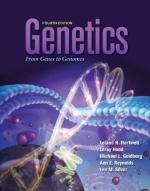|
This section contains 2,206 words (approx. 8 pages at 300 words per page) |

|
A genome is the complete collection of hereditary information for an individual organism. In cellular life forms, the hereditary information exists as DNA. There are two fundamentally distinct types of cells in the living world, prokaryotic and eukaryotic, and the organization of genomes differs in these two types of cells.
Prokaryotes comprise the bacteria and archaea. The latter were originally designated "extremophiles" because they favor such extreme environments as high acidity, salinity, or temperature. Prokaryotic cells tend to be very small, have few or no cytoplasmic organelles, and have the cellular DNA arranged in a "nucleoid region" that is not separated from the remainder of the cell by any membrane. Eukaryotes exist as unicellular or multicellular organisms. Among the unicellular eukaryotes are the protozoa, some types of algae, and a few forms of fungi, while the multicellular organisms include animals, plants, and most fungi.
Eukaryotic cells are larger...
|
This section contains 2,206 words (approx. 8 pages at 300 words per page) |

|


